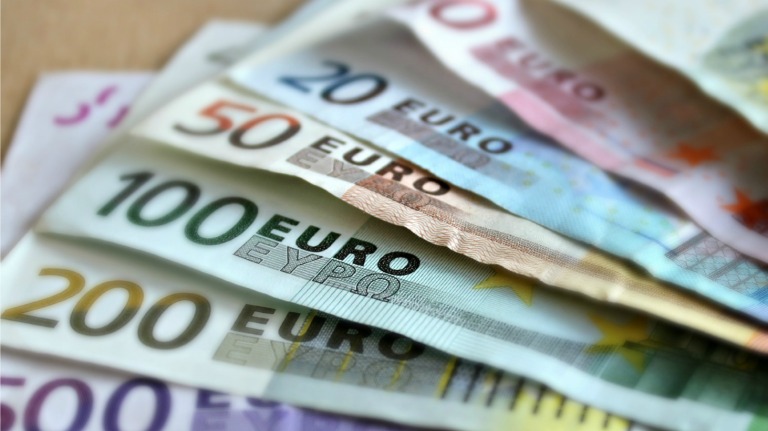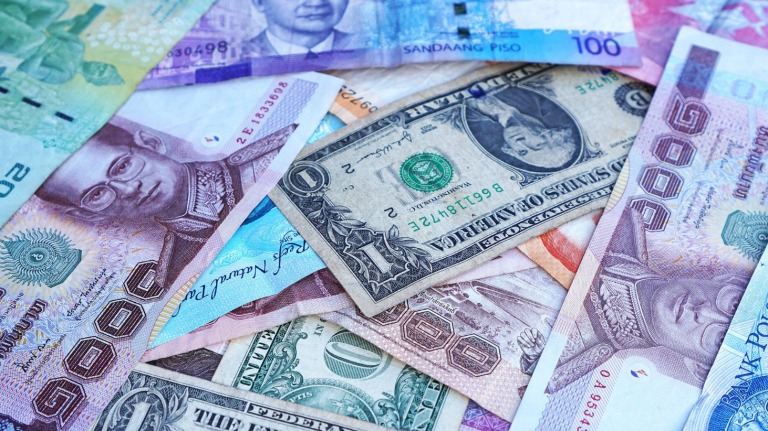Going away so much, I often get asked by friends, family and colleagues where I get my foreign currency from, and how to get the best deal on exchange rates.
Before I worked in marketing, I worked as a journalist for seven-and-a-half years. First as a financial journalist at a price comparison site, and then as the consumer tech journalist at MoneySavingExpert. Though I was a money-saver long before I joined the team at MSE, it was through working there that I learned a lot of my “travel tricks“. And though I haven’t worked there since October 2013, I still regularly check the site for deals and glitches that are going to save me money on travel, whether that’s at home in the UK, or abroad.
The MoneySavingExpert “Travel Money Max” tool is my go-to place for foreign currency, and it’s so easy to use (there’s even an app you can download for iPhones and Android mobiles). Simply pick the currency you want, type in how many pounds worth of that currency you want, and then select whether you want to collect the currency from a branch, from the airport, or get it delivered.
The tool then compares the rates from over 30 bureaux de change, and finds the best for you, based on your criteria and where you are.

As well as using the comparison tool, here are a couple of tips to ensure you always get the best rate when converting currency:
1. Don’t leave it ’til the last minute.
I cannot stress this point enough, but never ever leave buying your foreign currency until you get to the airport (the same applies for ferry terminals). Airports have captive audiences, and so charge some of the worst rates. If you have left it ’til the last minute, at least pre-order your currency online before you get to the airport (using the “Travel Money Max” app, if you can). This should give you a slightly better rate.
2. Check if the country you’re travelling to has a “closed” currency.
Some countries, such as Tunisia and Morocco have “closed” currencies. This means that the currency is not freely available outside its country of origin. You must exchange your foreign currency upon arrival as there are import restrictions. You should also aim to spend your remaining currency before leaving, as the restrictions on a closed currency extend to exporting it to. In the event that you are caught breaching these restrictions, you could find yourself dealing with the authorities.
3. Collect your currency at a bureau de change.
Collecting your currency at a branch will usually get you a better rate, and there won’t be a fee for sending it out to you. If you can, collect from a branch in London, even better – I’ve always found that the London bureaux offer the best rates.
4. Ask for a mixture of denominations.
One piece of advice I have to impart: always ask the cashier at the bureau de change for a mixture of notes (some high and some low).
While on my travels I’ve occasionally been in situations – like when buying water from a shop, or even when paying for a taxi – where the vendor will either not give me the correct change or will say they haven’t got any change, if I give them a high note. I’ll cover haggling prices and bartering in markets in another post, but to be safe, ensure that you’ve got some smaller denominations handy for when you arrive at your destination.

What about selling foreign currency back?
Though you can sell foreign currency back, most bureaux de change will only accept notes, so try and get rid of your coins before heading home.
Usually the rates of selling back currency are a lot lower than when you bought it, too. So if you know you will be going back to that country in the not-too-distant future, it’s probably worth hanging on to it. If not, is there someone you know travelling there? You could always offer them mates rates, and earn more than you’d get selling back to the bureau de change, but charge them less then they’d have to pay.
*****
Have you got any other tips on getting foreign currency? Leave me a comment, I’d love to hear from you.

So helpful! I’m travelling for three months soon and am desperately trying to get organised so thank goodness I stumbled across this.
charliedistracted.com
LikeLiked by 1 person
Glad it’s helped Charlie! And lucky you going away for three months!! ☺️
LikeLike
Hello!
Thanks to share this. It”s good to see that there are people that still prefer human contact 🙂 A much more responsible approach than going to an ATM actually, mainly abroad.
We have a free community app that may interest you and you readers; it helps people to locate the bureaux de change in most cities of the world and to rate/comment them. It’s called coChange and you can find it on the app stores.
I hope you will find it useful 🙂
LikeLiked by 1 person
ATMs charge astronomical fees sometimes – my friend got stung in Mexico for withdrawing 1,000 pesos – they charged her 100 pesos to withdraw, then she had bank currency conversion fees on top of that! Thanks for the recommendation of the app, I’ll check it out and see what I think 🙂
LikeLike
There are some great tips here. I used the MSE tool before my recent holiday to Mexico! x
LikeLiked by 1 person
I doubly like this comment – not just for the fact you used the MSE tool, but because you’ve been to Mexico! I’m off there on Thursday, cannot wait! Any tips? x
LikeLike
I always leave it until the last minute – last time I went away I got my Euros at the airport!
LikeLiked by 1 person
I wish there was a dislike button here lol! That’s the worst thing to do Hayley, you’ll not get as many euros for your pound at the airport 😦 x
LikeLike
Thanks so much for this, great tips for when we next go on holiday.
LikeLiked by 1 person
Oooh when and where are you going Victoria? x
LikeLike
I always get my currency quite far in advance because I know how much of a bad deal you get at the airport x
LikeLiked by 1 person
Yay! “Always be prepared”, that’s what I learnt from being a scout 😉 x
LikeLike
Great tips! Especially useful as we are going to Turkey next month!
LikeLiked by 1 person
That’s great – I’m glad the article was helpful to you! x
LikeLike
This is a really useful post and I was in a similar situation in India where you can’t buy the currency outside so had to exchange at the airport.
LikeLiked by 1 person
Really? I was able to get Indian rupees from a bureau de change before I went to India last April…? x
LikeLike
I’m so disorganised that I usually just wait til I’ve arrived and take money from the ATM!
LikeLiked by 1 person
Oh no, that’s the worst Jenny – your bank will probably charge you a fee for doing that! Next time you go away, try using the TravelMoneyMax tool to find the best place to get travel money near you x
LikeLike
These are such great tips for travelers. I usually wait until last minute and then just hit up my bank.
LikeLiked by 1 person
Well now you know Crystal, make sure you shop around for your currency next time, to ensure you get the most for your money x
LikeLike
Great info I never knew that some countries have a closed currency worth knowing definitely
LikeLiked by 1 person
Yes, it’s good to do a bit of research before you go x
LikeLike
Some great tips here – I leave the country so rarely that it’s not something I tend to think about too much but I’ll bear this in mind for my next trip.
LikeLiked by 1 person
Glad it was useful! It is definitely worth bearing in mind when you do next go abroad x
LikeLike
Such great tips. I get my money exchanged ahead of time but I never shopped arounded. Will make sure I do now!
LikeLiked by 1 person
Glad to hear it Tamsin, and happy to help x
LikeLike
These are some really great tips! Not leaving it until the last minute is important. I’ll share this post with my sister as she’s going abroad at the end of this month and I think she would find this very helpful.
LikeLiked by 1 person
Thanks for sharing it Sarah Bella – I hope she does find it helpful x
LikeLike
I’m off to Bulgaria in under a month so this is very welcome advice 🙂
LikeLiked by 1 person
Oohh great stuff! I’ll have to keep an eye on your blog, as I’ve never been to Bulgaria and am debating whether to go or not! x
LikeLike
This is a very informative post for travellers. I didn’t know the term ‘closed currency’ Very good suggestions. R
LikeLiked by 1 person
Thanks for your comment Rosana – I’m glad you found it helpful x
LikeLike
I always get my foreign currency in advance as I do most of the prep work for our family and it is one of the most important things to have. I also like to have mixed notes as it’s not always easy to get a larger bill changed.
LikeLiked by 1 person
A lady after my own heart Melanie, I’m so glad to hear it! Mixed denominations is a must x
LikeLike
Thanks a lot for these great tips.I will bear this in mind for my next trip.What a helpful post.
LikeLiked by 1 person
You’re welcome Jess x
LikeLike
These are such helpful tips, I’m so bad for leaving it to the last minute! I’d never thought to ask for a mixture of denominations, that’s a really great idea 🙂
LikeLiked by 1 person
It really does help Jess – especially when it comes to things like tipping x
LikeLike
These are really great tips! I will keep this in mind for my next holiday!
LikeLiked by 1 person
Thanks Sarah – I hope you have a fantastic time when you next go away x
LikeLike
Well I never knew about closed currency countries, good advice here and I learnt something new 😁
LikeLiked by 1 person
Everyday is a school day Lisa! Glad to help 🙂 x
LikeLiked by 1 person
I’ve heard of a website called ‘We Swap’ that is supposed to be amazing for getting the best currency!
LikeLiked by 1 person
Thanks for the suggestion Sabina – I’ll check it out x
LikeLike
Thanks so much for this! I am going to Croatia next month, so will need to get some currency soon!
LikeLiked by 1 person
No probs hun – it’s a great little tool, I always use it whenever I go away anywhere x
LikeLike